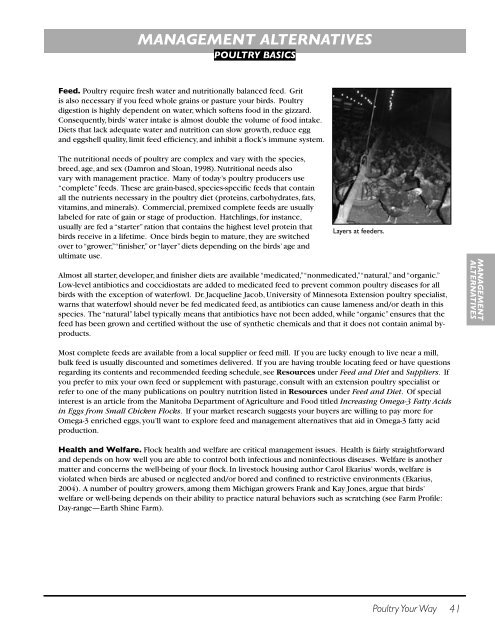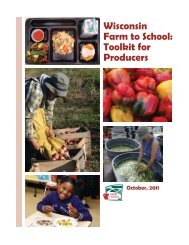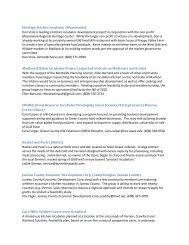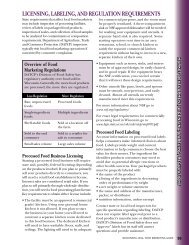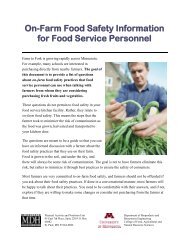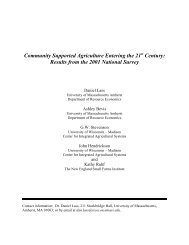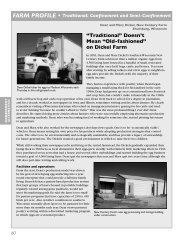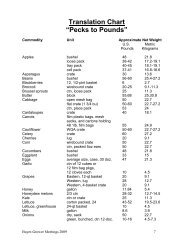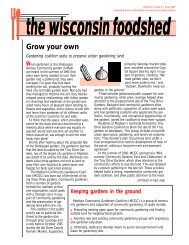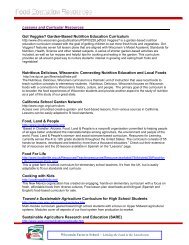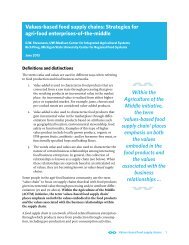Poultry Your Way - Center for Integrated Agricultural Systems ...
Poultry Your Way - Center for Integrated Agricultural Systems ...
Poultry Your Way - Center for Integrated Agricultural Systems ...
Create successful ePaper yourself
Turn your PDF publications into a flip-book with our unique Google optimized e-Paper software.
MANAGEMENT ALTERNATIVES<br />
POULTRY BASICS<br />
Feed. <strong>Poultry</strong> require fresh water and nutritionally balanced feed. Grit<br />
is also necessary if you feed whole grains or pasture your birds. <strong>Poultry</strong><br />
digestion is highly dependent on water, which softens food in the gizzard.<br />
Consequently, birds’ water intake is almost double the volume of food intake.<br />
Diets that lack adequate water and nutrition can slow growth, reduce egg<br />
and eggshell quality, limit feed efficiency, and inhibit a flock’s immune system.<br />
The nutritional needs of poultry are complex and vary with the species,<br />
breed, age, and sex (Damron and Sloan, 1998). Nutritional needs also<br />
vary with management practice. Many of today’s poultry producers use<br />
“complete” feeds. These are grain-based, species-specific feeds that contain<br />
all the nutrients necessary in the poultry diet (proteins, carbohydrates, fats,<br />
vitamins, and minerals). Commercial, premixed complete feeds are usually<br />
labeled <strong>for</strong> rate of gain or stage of production. Hatchlings, <strong>for</strong> instance,<br />
usually are fed a “starter” ration that contains the highest level protein that<br />
birds receive in a lifetime. Once birds begin to mature, they are switched<br />
over to “grower,” “finisher,” or “layer” diets depending on the birds’ age and<br />
ultimate use.<br />
Layers at feeders.<br />
Almost all starter, developer, and finisher diets are available “medicated,” “nonmedicated,” “natural,” and “organic.”<br />
Low-level antibiotics and coccidiostats are added to medicated feed to prevent common poultry diseases <strong>for</strong> all<br />
birds with the exception of waterfowl. Dr. Jacqueline Jacob, University of Minnesota Extension poultry specialist,<br />
warns that waterfowl should never be fed medicated feed, as antibiotics can cause lameness and/or death in this<br />
species. The “natural” label typically means that antibiotics have not been added, while “organic” ensures that the<br />
feed has been grown and certified without the use of synthetic chemicals and that it does not contain animal byproducts.<br />
Most complete feeds are available from a local supplier or feed mill. If you are lucky enough to live near a mill,<br />
bulk feed is usually discounted and sometimes delivered. If you are having trouble locating feed or have questions<br />
regarding its contents and recommended feeding schedule, see Resources under Feed and Diet and Suppliers. If<br />
you prefer to mix your own feed or supplement with pasturage, consult with an extension poultry specialist or<br />
refer to one of the many publications on poultry nutrition listed in Resources under Feed and Diet. Of special<br />
interest is an article from the Manitoba Department of Agriculture and Food titled Increasing Omega-3 Fatty Acids<br />
in Eggs from Small Chicken Flocks. If your market research suggests your buyers are willing to pay more <strong>for</strong><br />
Omega-3 enriched eggs, you’ll want to explore feed and management alternatives that aid in Omega-3 fatty acid<br />
production.<br />
Health and Welfare. Flock health and welfare are critical management issues. Health is fairly straight<strong>for</strong>ward<br />
and depends on how well you are able to control both infectious and noninfectious diseases. Welfare is another<br />
matter and concerns the well-being of your flock. In livestock housing author Carol Ekarius’ words, welfare is<br />
violated when birds are abused or neglected and/or bored and confined to restrictive environments (Ekarius,<br />
2004). A number of poultry growers, among them Michigan growers Frank and Kay Jones, argue that birds’<br />
welfare or well-being depends on their ability to practice natural behaviors such as scratching (see Farm Profile:<br />
Day-range—Earth Shine Farm).<br />
<strong>Poultry</strong> <strong>Your</strong> <strong>Way</strong> 41<br />
MANAGEMENT<br />
ALTERNATIVES


